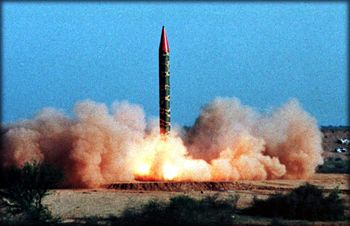
WEEKLY INDEPENDENT
September 14, 2001
September 14, 2001
By
Dr. S. Farooq Hasnat
In September this year Pakistan became a target of yet another United States imposed series of sanctions. The recent sanctions entitled Category II, deals with the supply of Chinese components for Missile development. Pakistan is already under sanctions for Category I, which links with the missile itself, while Category II relates to missile parts and technology. The United States insists that the transfers in question violate the Missile Technology Control Regime (MTCR). Pakistan denies any such transfers and regards these newest of new sanctions as unwarranted and one sided. One has to bear in mind that by any definition and logic the recent action of the American government can be categorized as a deliberate attempt to enforce a targeted or selective policy to punish Pakistan and the act is not in violation of any international law. Understandably, the U.S. collaborates with Sharon's Israel for Arrow ballistic missile development.
Dr. S. Farooq Hasnat
In September this year Pakistan became a target of yet another United States imposed series of sanctions. The recent sanctions entitled Category II, deals with the supply of Chinese components for Missile development. Pakistan is already under sanctions for Category I, which links with the missile itself, while Category II relates to missile parts and technology. The United States insists that the transfers in question violate the Missile Technology Control Regime (MTCR). Pakistan denies any such transfers and regards these newest of new sanctions as unwarranted and one sided. One has to bear in mind that by any definition and logic the recent action of the American government can be categorized as a deliberate attempt to enforce a targeted or selective policy to punish Pakistan and the act is not in violation of any international law. Understandably, the U.S. collaborates with Sharon's Israel for Arrow ballistic missile development.
Pakistan can clearly be regarded as the most sanctioned nation. There are imposed sanctions of varying categories, ranging from arms embargo to economic - spreading over five layers. Nowhere in history do we find an example where an ally was subjected to such a huge degree of discrimination and punitive actions. And in no times can we find an instance where a subjected nation would repeatedly approach the punisher for a relief. To borrow from Edward Said, even if we appeal to the United States for six thousandth times we would get the same response that we should stop all terrorist activities and comply with the policies of the sole super power of the epoch. It seems that Pakistan is on the edge of being declared as a “Terrorist or minimum a Rogue State”.
It becomes apparent that Pakistan is being linked with the “Afghan Sanctions Regime”. Recently the UN Security Council criticized the Kabul regime’s “continued support for international terrorism, refusal to hand over Osama bin Laden, and failure to comply with its resolutions”. The Security Council declared that Afghan government must fully comply with the decision of the Council. In a similar action by the Council, it was decided that more than fifty per cent of 15 UN monitors of the Sanctions Enforcement Support Team should be deployed at Pak-Afghan borders, to enforce arms transfer from Pakistan. A strong link between the Talibans and uncontrolled militant gangs in Pakistan are highly suspected by the world at large. A remarkable reality is that on Afghanistan, all permanent members of the UN Security Council are of the same view. There exists a unanimity of interests towards that country, to which Shanghai five is a clear testimony.
With the imposing of recent sanctions, Pakistan can be easily categorized as a country under tremendous international pressures of varying degree. The process of isolation was gradual, starting with the 1965 arms embargo, during the September War with India. Pakistan was subjected to every possible adverse regional activity and was unable to blend vital interests with the changing international and regional scenes.
The stage for the enforcement of Pakistan related Sanctions Regime was already set even before the nuclear blasts of May 1998. Realizing that it alone was left in the International economic system to enforce the values of the post-cold war era, the United States started to pursue vigorously a certain set of principles. At the same instance it made it clear in numerous policy projections and actions that the violators of the new rules would be dealt with severely.
A cruel crunch came when economically vulnerable Pakistan found it hard to cope with the post-nuclear economic sanctions imposed by the American-led grouping of industrialized nations. The misery is further aggravated as Pakistan heavily relies on International monitory linkages/financial assistance, with an added handicap of huge financial debt. Aware of Pakistan's weak trade and industrial base, on April 15th, 2000, President Bill Clinton, while addressing the people of Pakistan on Pakistan TV, said in clear terms that Pakistan must comply (at that time the issue was signing of the CTBT), in order to become part of the new International system. What President Clinton implied and which his spokes people in Washington, D.C. further elaborated, was a clear signal to Pakistan that without economic assistance, Pakistan cannot even sustain its security through nuclear weapons. A linkage was thus established between a compliance to a certain demand and Pakistan related economic sanctions.
The question of the timings and the implications of the series of imposed Sanctions and other possible forthcoming becomes a crucial dilemma for Pakistan’s security. Without the presence of such public bodies like the National Assembly and the Senate the defense becomes even more difficult. Even more crucial implication of the CTBT question refers to the subject of the imposition or lifting of the Economic Sanctions, especially by the United States - not to be ignored are the U.S. allies like Japan and Germany, in particular. Another adverse environment, in which we have to operate, is the inability of Pakistan's capacity to re-establish effective links with the traditional friends like Iran, Turkey and other Middle East countries. Such regional organizations like Economic Cooperation Organization (ECO) are in disarray, the Commonwealth and the South Asian Association for Regional Cooperation (SAARC) have snubbed us enough to attach any hope on them.
The compound mechanism of global and bi-lateral relations, as explained above, brings in light the vital question of Economic Sanctions on Pakistan. The fact of the matter is that Pakistan has been isolated effectively, in political terms and more so in economic fields. Thus, the imposing or lifting of Economic Sanctions by the U.S. in particular becomes a vital concern for our policy makers. The multi-dimensional repercussions, as it occurs in either situation, should become a focus of investigation.
The United States has applied economic sanctions as a "part of a coherent strategy." The U.S. has used the policy of Economic Sanctions frequently, especially after 1993. All Sanctions of this category were applied as an intentional tool of coercion and were enforced 111 times since World War I and 104 times since 1945. Since 1993 the frequency of economic coercive acts multiplied and was enforced in at least 61 instances. More than half of the economic sanctions in the last 82 years have been imposed since 1993 (in only 4 years according to June, 1998 estimates). The U.S. coercive methods to use the Economic instrument include countries like Sudan, Iran-Libya Sanctions Act and Pakistan and India (1998).
The effectiveness of the economic sanctions as an instrument of policy is being debated in the United States. The intentions of the Economic Sanctions as an instrument of foreign policy are clearly spelled out by Stuart E. Eizenstat, Under Secretary of State for economic, Business and Agricultural Affairs while testifying before the U.S. House of Representatives' International Relations Committee. On June 03, 1998, i.e., just after the Indian nuclear test of May 11 and 13, followed by Pakistan's underground series of tests on May 28 and May 30 the Under Secretary said: "Sanctions are most effective when they have broad multinational support and participation. Multilateral sanctions maximize international pressure on the offending state. They show unity of international purpose. And because they are multilateral, these sanctions regimes are more difficult to evade or avoid…"
He went on to state that the sanctions can only be "truly effective means for influencing the policies and behavior of other countries", if they are supported at international level, especially by the industrialized economic powers. The statement implies that in the past some of the sanctioned nations have evaded these constraints by breaching the isolation circle. This became possible by a well thought comprehensive strategy, accompanied by superior diplomatic achievements, as in the case of Iran - while Pakistan was unable to perform such a feat.
One side of the argument is that by signing the CTBT, as demanded by Japan on September 6th of this year, Pakistan can avoid the snow-ball effects of international pressures; thus negating the adverse impact of the economic action. On the contrary, the negative implications of a single-item agenda remain strong, i.e., even if we abide by the demands of the CTBT as expressed by the Japanese.
After assessing Pakistan's potential dangers and dilemmas, certain policy postures are recommended with an inference that we are able to successfully deal within a highly complicated surroundings and issues.
The presumptions are that signing the CTBT alone would not release economic and political pressures on Pakistan. The United States is not going to encourage any substantial financial activity, nor will there be a regional and international acceptability. Pakistan must take further steps within a framework of a five point "package-Action", meaning that:
- It must stop close links with the Talibans and cooperate with the friendly regional states to establish a multi-national government in Kabul.
- Accept the Hurriyet Conference as the sole representatives of the Kashmiri people and support their decisions;, i.e., in stead of mulling the issue with the Indians.
- Impose Ban and take strict action against all terrorist groups in the country. The Interior Minister is on record to have said that his government is considering taking action against four terrorist gangs; while a meek and confusing action was taken against the two non-visible organisations.
- Pakistan must return to the elected Parliament and the Senate much earlier than announced. Even Pakistan's closest allies in the Muslim World are hesitant to accept the military regime. Unnecessary delays are going to pose more problems for the already distorted society. In July 2001, Christina Rocca, Assistant Secretary for South Asia in the State Department, clearly said that "Section 508 of the sanctions on Pakistan could not be lifted until President Bush is able to certify that democracy is restored". She further elaborated that in this matter the U.S. President has "no waiver authority".
- All the mentioned five actions must be taken simultaneously. That will release immediate regional and international pressures and Pakistan can get sufficient space to plan its dynamic future.


No comments:
Post a Comment